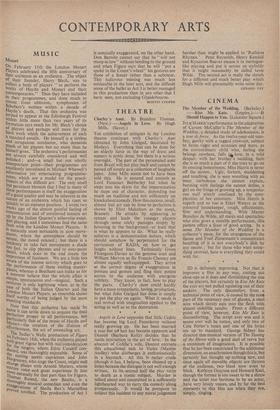CONTEMPORARY ARTS
MUSIC Mozart ON February 11th the London Mozart Players celebrated the fifth anniversary of their existence as an orchestra. The object of their founder, Harry Blech, was to collect a body of players " to perform the Works of Haydn and Mozart and their contemporaries." Thus they have included hi their programmes, and done much to rescue from oblivion, symphonies of Schubert's written within a decade of Ilaydn's death. That this orchestra was invited to appear at the Edinburgh Festival within little more than two years of its formation says much for Mr. Blech's choice of players and perhaps still more for the hard work which the achievement of such a standard entails. He himself is a tireless and scrupulous conductor, who demands Much of his players but no more than he himself gives. The orchestra's performances are always carefully considered and well Polished ; and—a small but not wholly unimportant point—their programmes are excellently introduced in Michael Whewell's informative yet entertaining programme- notes, which are a model for the practi- tioners of this difficult ;11-t.' The only small but persistent blemish that I find in many of these performances is itself the exaggeration "a good quality and may be inherent in the nature of an orchestra which has risen so quickly to an eminent position. I wrote two Weeks ago of the almost painful feeling of Concentration and of unrelieved tension set ‘113 by the Italian Quartet's otherwise exel- 'Pautl tp wiyhgth ea nLdo In dsoonm Mmozeasr fti nPdla tyheer ame It is naturally most noticeable in slow move- ments, where the atmosphere should be serene, the mood relaxed ; but there is a tendency to take fast movements a shade too fast, to clip phrases and to over-point tie. tail, which does in the end create the Impression of fussiness. We are a little too aware of the intense activity which goes to the performance of these smiling master- pieces, whereas a Beecham can make us for a moment believe that the whole affair is simple, spontaneous and—magical. Such a criticism is only legitimate when, as in the C„a_se of both the Italian Quartet and the !-4endon Mozart Players, an ensemble shows itself worthy of being judged by the most exacting standards. Now that this orchestra has made its name it can settle down to acquire the final Perfection proper to all performance, but Particularly that of the music of Haydn and Mozart—the creation of the illusion of effortlessness, the art of concealing art. The Sadler's Wells production of Figaro On February 16th, when the orchestra played With great vigour but with real consideration for the singers, whom Edric Lundell con- dhuec 1edwas thoroughly y enjoyable, Some of }la 'esting seems capricious and John e rgreaves, who sings the Count, might Well mature places with Arnold Matters, whose more voice and great experience fit him _ore naturally for that part than for Figaro. troomas Round, the new Basilio, is a exaggerations r"ghlY musical comedian and even the proved of Sheila Rex's Marcellina P oved justified. The production of Act 1 is comically exaggerated, on the other hand. Don Bartolo cannot say that he "will not stoop so low" without bending to the ground and when Figaro says that he will "put a spoke in the Count's wheel" his gestures are those of a fencer rather than a saboteur. This ludicrous miming was much less noticeable in the later acts, and the difficult scene of the ballet in Act 3 is better managed in this production than in any other that I have seen, not excluding Glyridebourne.
MARTIN COOPER


































 Previous page
Previous page